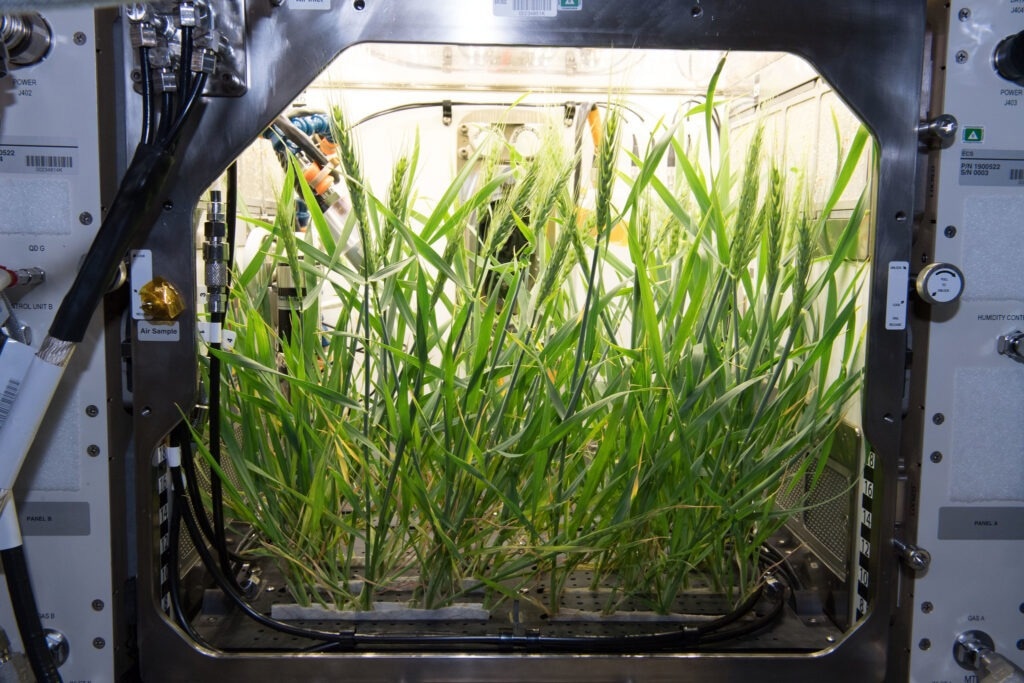Genetic manipulation was used by humans for millennia, long before they worked in lab coats Selective breeding has been employed for a very long time to produce plants and animals of great value, from adorable dogs to palatable fruit.
 Plants aboard the International Space Station. Image Credit: NASA
Plants aboard the International Space Station. Image Credit: NASA
In laboratories these days, scientists perform more accurate genetic manipulation. However, the outcomes have not always been great. Until recently, genetic alteration may have been a little clunky, producing organisms that thrived in the laboratory but not in the real world.
Taking control
Professor Ryan Lister of the University of Western Australia has co-authored research on how more complex genetic editing might improve plant design.
Organisms have complex programs that control when, where and to what degree genes are turned on or off. We want to genetically modify plants with sophistication equal to what natural evolution has achieved.”
Ryan Lister, Professor, University of Western Australia
These intricate control programs, which emerged spontaneously, enable the plant to respond to its surroundings. A plant, for instance, may have spontaneously evolved a gene that is only “turned on” under extreme heat conditions. Researchers can replicate the genetic control program in another area of the plant if they can figure out the natural genetic mechanism that activates that gene. In this case, it means that it is possible to program a plant to react to heat in a specific way.
Climate-proofing
Understanding this level of genetic manipulation could give researchers more control over plant economic output. It might transform them into perfectly tuned biological factories that effectively produce high-value molecules, or it could boost their resistance to harsh external effects like pests and climate change.
This research has numerous applications. It has the potential to be a game changer in Australia’s agricultural sector, which is becoming extremely sensitive to extreme environmental conditions.
“When weather becomes unpredictable, it causes destabilization to established systems,” adds Ryan Lister.
As a result, climate-proofing plants would have been most likely an obvious application of the research findings.
What about cultivating plants in space? Can Ryan's research assist us in this endeavor?
Space seeds
Ryan is a member of the Australian Research Council Centre of Excellence in Plants for Space, a multi-university research effort. The initiative will investigate how to create plants that flourish in off-Earth environments.
As humans have spread across the world over the past many thousands of years, we’ve taken plants with us. Plants underpin our civilization and enrich our lives and our health. Not to mention, they’re incredibly efficient and versatile machines that can create an enormous diversity of molecules and materials.”
Ryan Lister, Professor, University of Western Australia
It would be impossible to carry machinery that produces medicine or other materials if colonies are founded on the Moon or Mars. However, if plants are genetically modified to generate specific compounds on demand, all that is needed is to bring the seeds to develop those plants.
Back on the ground
Ryan’s study can be used for other things, including vertical farming, back on Earth. The revolutionary agricultural method is based on precisely controlled environmental inputs.
When we grow plants in an efficient indoor controlled environment, we can achieve very high growth and productivity with really low nutrient and water usage. But these are entirely different environments from what the plants evolved in, and they come with their own challenges. We aim to overcome these to achieve even greater productivity and versatility.”
Ryan Lister, Professor, University of Western Australia
Ryan Lister concludes, “Indoor agriculture could remove the challenges of transporting fresh produce from distant farms where they’re conventionally produced to the major points of demand and consumption. And for some countries that are land constrained, this could be a real boon for overcoming challenges of food sovereignty.”
Numerous steps must be taken in order to produce genetically altered plants on Mars. But, as anyone who has experimented with gardening knows, enormous things develop from small things.
Climate Change Could Affect Global Agriculture Within 10 Years
Video Credit: NASA via YouTube.
Source:
Journal reference:
Lloyd, J. P. B., et al. (2022) Synthetic memory circuits for stable cell reprogramming in plants. Nature Biotechnology. doi.org/10.1038/s41587-022-01383-2.